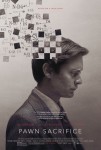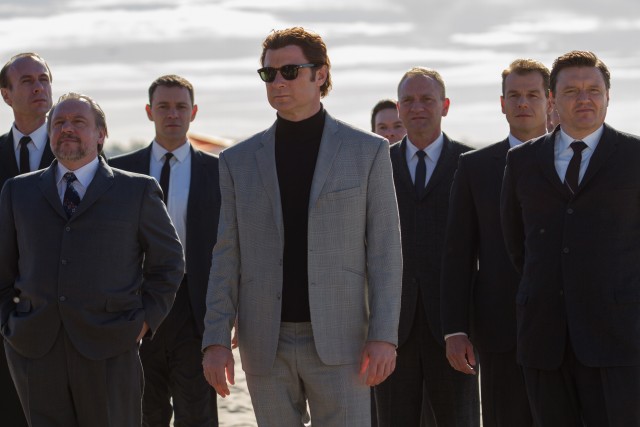Pawn Sacrifice Movie Review
 |
Pawn Sacrifice
Theatrical Release: September 16, 2015 / Running Time: 116 Minutes / Rating: PG-13 Director: Edward Zwick / Writers: Steven Knight (story & screenplay); Stephen J. Rivele, Christopher Wilkinson (story) Cast: Tobey Maguire (Bobby Fischer), Liev Schreiber (Boris Spassky), Michael Stuhlbarg (Paul Marshall), Peter Sarsgaard (Father Paul Lombardy), Edward Zinoviev (Efrian Geller), Alexandre Gorchkov (Livo Nei), Lily Rabe (Joan Fischer), Robin Weigert (Regina Fischer), Seamus Davey-Fitzpatrick (Teenage Bobby Fischer), Aiden Lovekamp (Young Bobby Fischer), Sophie Nιlisse (Young Joan Fischer), Evelyne Brochu (Donna), Carmine Nigro (Conrad Pla), Vitali Makarov (Ivanovich), Brett Watson (Lothar Schmid), Igor Ovadis (Russian Bookstore Owner), Bobo Vian (Bookstore Owner's Wife) |
Oscar season has begun, but mostly at the different film festivals that usher in the fall. Mid-September is the right time for Pawn Sacrifice to open. It's a fall movie, a serious drama with some strong acting from established talents. But it's also from a studio whose first release came just five months ago and is sure not to be remembered a few months from now when the anticipated heavyweights try to live up to the hype and hope.
Pawn is a biopic of Bobby Fischer, the American chess prodigy who became an international celebrity in the 1960s for his high-profile matches against the game's greatest Soviet minds. Most of the time, Tobey Maguire plays Fischer, a Brooklynite who from a young age is suspicious of surveillance, his Russian-speaking political activist single mother (Robin Weigert) attracting some attention from government agents. Displaying his gift and devotion to chess from his 1950s childhood (in which he is played by Aiden Lovekamp and then Seamus Davey-Fitzpatrick), Deemed America's only competition to the USSR's most talented players, the now adult Fischer finds a benefactor in the patriotic chain smoker Paul Marshall (Michael Stuhlbarg) and a trainer in chess grandmaster and Catholic priest Father William Lombardy (Peter Sarsgaard). Fischer's participation in the 1972 world chess championship in Iceland puts him on a path to face the pride of the Soviet Union: the closely guarded and super cool Boris Spassky (Liev Schreiber). As media scrutiny intensifies during the height of the Cold War, Fischer grows increasingly paranoid, distrusting his closest allies, making ridiculous demands for playing conditions and pay, and developing a hatred for Communists and Jews. Fischer's remarkable devotion to the game seems to come at the cost of mental sanity, though the stubborn New Yorker is vehemently opposed to the medical treatment his handlers suspect might help him.
Pawn Sacrifice features some terrific acting. For a while, Maguire seemed destined for the obscurity that has plagued other actors identified with larger than life heroics, from Mark Hamill to Brandon Routh. After Sony decided to hastily reboot Spider-Man instead of giving Sam Raimi the time he needed to do a fourth film right, Maguire kind of faded, and his supporting role in Life of Pi was recast after he filmed it. He then got a career boost from 2013's The Great Gatsby, playing the straight man and true protagonist alongside his longtime buddy Leonardo DiCaprio's Gatsby. Pawn gives the actor, who it's tough to believe turned 40 over the summer, a chance to impress with a New York accent and an explosive personality. He won't pick up his first Oscar nomination or his second Golden Globe nod, but this lead performance (which overcomes some unnecessary carefully placed facial moles) serves as a welcome reminder that Maguire's acting abilities go well beyond the blockbuster comic book fare that made him a household name.
Maguire's supporting cast also appeals. The film is at its best in scenes of Fischer and his two conflicted confidantes (Stuhlbarg and Sarsgaard) strategizing and dabbling in compromise. Though it's strange casting, Schreiber also acquits himself in the role of affable antagonist, his predominantly Russian dialogue convincing ears unversed in the language.
The biggest shortcoming of Pawn Sacrifice is its pedestrian direction. The problems announce themselves immediately with a series of real news reports from around the world on Fischer's no-show at the second game of his widely-watched series with Spassky. This archival footage provides valuable context, but it soon outstays its welcome, with no fewer than four different nations telling the same story in different tongues. This is a warning of things to come, with the movie relying much too frequently on overly familiar period songs and distractingly fake news report recreations aged to look authentic.
You might be willing to forgive such missteps as the product of a newcomer's overexuberance. But Edward Zwick should certainly know better. The 62-year-old has worked in the business for well over half his life and has been directing feature films for the past thirty years. Besides producing such Oscar winners as Shakespeare in Love and Traffic, Zwick has directed films like Glory, Legends of the Fall, The Last Samurai, and Blood Diamond. There is possibly a great film that could be made with this cast and concept, but Zwick instead gives us something that is simply pretty good. Not all of his instincts are bad. The film, whose screenplay is credited to the UK's Steven Knight (enjoying a bit of a renaissance with recent credits like Locke, The Hundred-Foot Journey, and TV's "Peaky Blinders"), does a good job of enabling you to follow and invest in scenes of chess play, regardless of what you know about the game. A little familiarity of the pieces and their moves will go a long way to helping you appreciate Fischer's manner of play. Still, Zwick stretches it too far, drawing out the Fischer-Spassky series longer than he should and bringing the movie closer to two hours than it needs to be.
The film's closing footage of the real Fischer in old age, conspiratorial as ever, illustrates how this PG-13 biopic does not do its tormented subject full justice. It paints him not as a hateful fugitive nut in the making but as a brilliant eccentric worthy of our sympathy, whose demands for softly whirring cameras to be pushed back and treatment of the motel skank taking his virginity are supposed to inspire chuckles. This bitter ending provides a hint of the bite this film could use more of instead of basically aspiring to the mold of inspirational period sports drama Disney has kept in fashion this century.
|
Related Reviews:
DVDizzy.com | DVD and Blu-ray Reviews | New and Upcoming DVD & Blu-ray Schedule | Upcoming Cover Art | Search This Site
DVDizzy.com Top Stories:
Now in Theaters: Everest Black Mass A Walk in the Woods
Written by Steven Knight: The Hundred-Foot Journey Eastern Promises Dirty Pretty Things
Tobey Maguire: The Great Gatsby Spider-Man The Details The Ice Storm Labor Day
Liev Schreiber: Salt Lee Daniels' The Butler Fading Gigolo
Peter Sarsgaard: Orphan An Education Flightplan Blue Jasmine Knight and Day
Michael Stuhlbarg: A Serious Man Hugo Men in Black 3
Miracle McFarland, USA The Greatest Game Ever Played Glory Road Forrest Gump Remember the Titans
Text copyright 2015 DVDizzy.com. Images copyright 2015 Bleecker Street Pictures, Mica Entertainment, and Material Pictures. Unauthorized reproduction prohibited.

